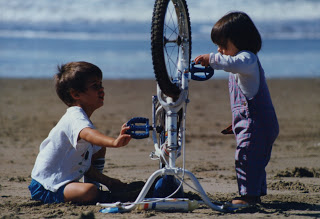
Lisa’s recent post describing how moral courage has its roots in empathy had me thinking. What about those times when empathy is blighted or stunted? What becomes of moral courage then? We can look back into history to find periods of what we might call “low empathy” – times when public torture and execution were carnival attractions, when heavy-handed corporal punishment of children or slaves/serfs/servants was commonplace, when mockery and abuse of the disabled was the stuff of fun and games, when might made right, life was cheap, and persecution of selected out-groups was sanctioned by law. Under these conditions, how did “moral action” occur? How did the “family” of humanity uphold mostly positive behavior and tend toward care and flourishing rather than harm? In other words, how did the family make enough “right” or “good” decisions to survive in these times? We are born hard-wired for empathy, but someone has to teach us how to turn it on. As a gardener, I think of it in gardening terms, and so I see empathy as a seedling that must be nurtured and cultivated, or the flower can wither on the vine. How did this plant stay alive under some of the harsh conditions history has witnessed?
We might infer at least two things about this from a quick glance back at history. First, it is clear that there were often eras when civilizations did not flourish, but declined into darkness or anarchy. Historically, periods of chaos were often precipitated by environmental assaults (famines, plagues, extreme climate events such as prolonged droughts) or social upheavals (invasions, wars, and revolutions political, ideological, or technological). Often the social catastrophes followed hard on the heels of the environmental ones, magnifying the disruptive effect of both, and the chaos prompted by these crises sometimes took many generations to recover from. Scarcity of resources can narrow the scope of our empathy from concern for all others, to concern just for those most like us, to those closest to us, and finally, to ourselves alone.
Secondly, we can see that extremely domineering law/justice systems (autocratic kingly dynasties, strict or wrathful theologies and political dogmas) can enforce good or “moral” behavior, or at least constrain immoral behavior, but primarily by threat of punishment (in this life or after), rather than by promoting empathy. This suggests a tendency to rigidly adhere to the letter of the law, ignoring the spirit behind it. Just as toddlers obey rules because they fear punishment, rather than because they have internalized the “spirit of the law” or the values behind the rules (fairness, accountability, cooperative flourishing, etc.), societies held in check by a totalitarian or despotic state or ideology can easily devolve into anarchy when that system collapses. (Remember Yugoslavia, to cite just one example from recent history?) A breakdown in empathy, or concern for others, which is prompted by disruption, upheaval and fear (on the family level or the societal level) may thus compel the parent or the state to lay down stricter and stronger rules/laws and punishments. This is a downward spiral that takes significant moral courage to reverse.
Yet it is out of scenarios such as this that great moral heroes can emerge, from some hidden garden where the seeds of empathy were kept watered and sheltered. Because the norm in these scenarios is low empathy, these moral heroes almost seem to appear by superhuman agency, giving rise to mythologies and heroic legends. Yet we all have the capacity for empathy, and thus for moral courage. When times get tough we can run for cover and let the Devil take the hindmost, or we can stand our ground and focus on raising good citizens of the world. How does your garden grow?


